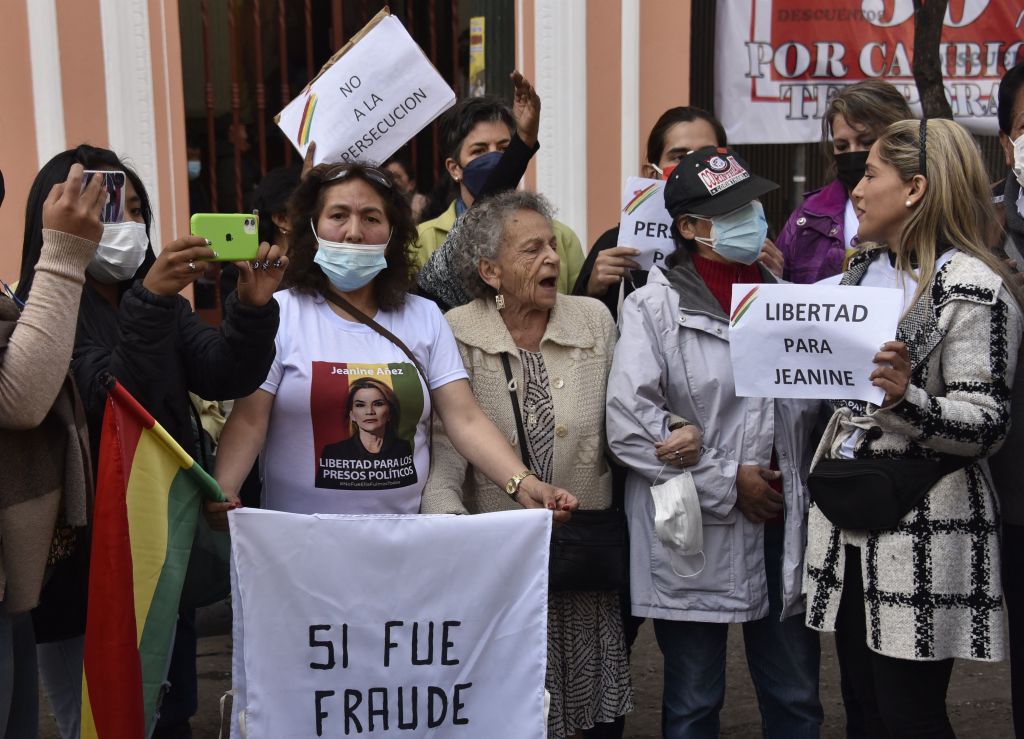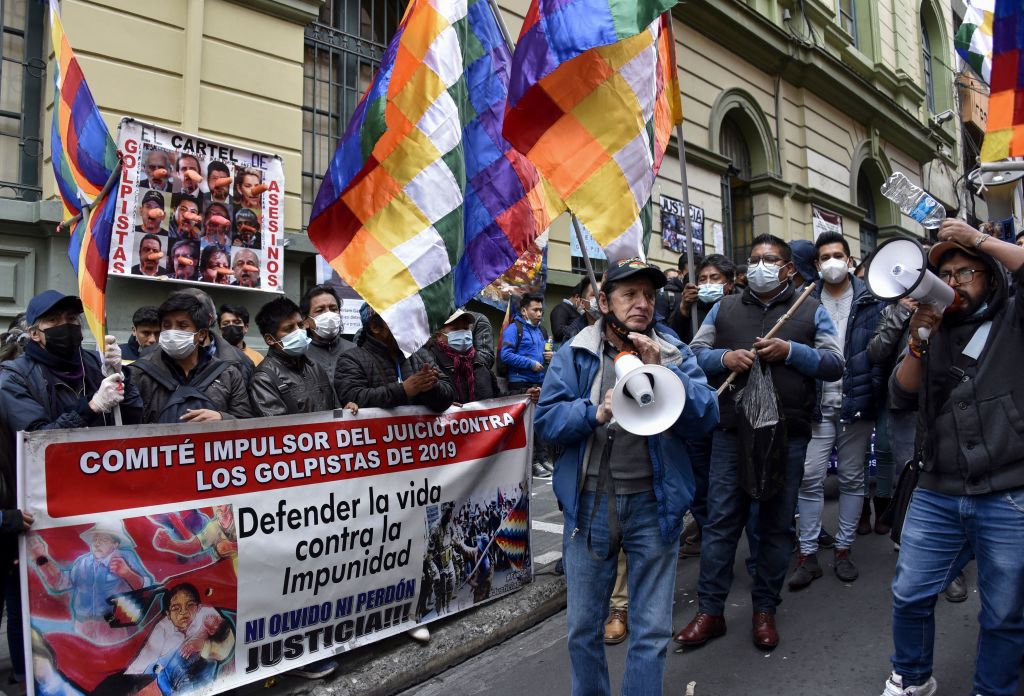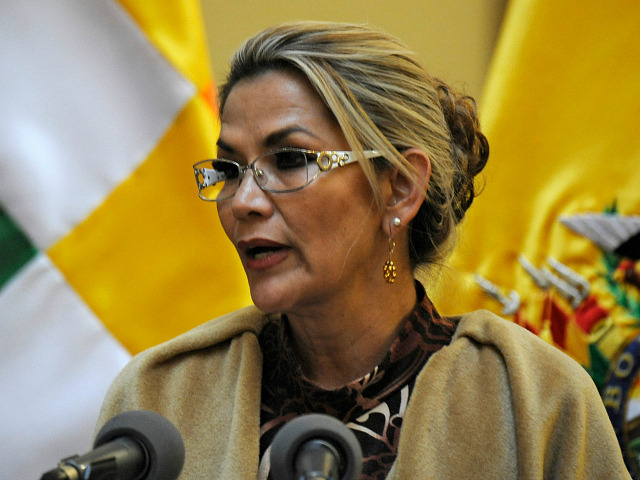Lawyers for conservative former President Jeanine Áñez announced on Monday that they would appeal a conviction handed down last week by a Bolivian court sentencing her to ten years in prison for constitutionally assuming the presidency in 2019.
The socialist-controlled government accused Áñez for years of staging a “coup” against precedessor Evo Morales. In reality, Morales voluntarily fled the country in November 2019 after the Organization of American States (OAS) published a report finding irregularities indicating fraud in the presidential election a month prior. Morales took dozens of cabinet members from his Movement Towards Socialism (MAS) party with him to Mexico, leaving Áñez, then a senior senator, the top person in the constitutional line of succession left in the country at the time she was sworn in.
A judge sentenced Áñez to a decade in prison on the “coup” charges but did not address previous attempts to charge her with “terrorism,” “genocide,” or other spurious crimes.
Áñez’s attorney Alaín de Canedo told reporters in a press conference on Monday that her legal team would file for an appeal against the sentence and, in the event that the court affirms or extends it, de Canedo would bring the case to the Interamerican Court of Human Rights (CIDH), a regional international law body.
De Canedo told reporters that the MAS government of President Luis Arce, which remains close to Morales, deprived Áñez of due process in a variety of ways, including processing her case through a common criminal court instead of a constitutional court when the matter at issue was whether or not her inauguration as president was constitutional.
“He also challenged that she [Áñez] was not allowed to be present at her own trial, that ’90 percent of evidence presented’ in her defense was not admitted, and that the trial went on while the ex-president was ‘doped’ due to her delicate state of health,” the Bolivian newspaper Jornada reported.
De Canedo called the trial a “shame” and asserted the legal team would involve “international courts.”
The socialist government’s Attorney General’s office announced it would also appeal the sentence when the court formally hands it down on Wednesday in an attempt to extend the sentence. State prosecutors had initially demanded 15 years in prison for Áñez and confirmed they would again make the same request on appeal.
Bolivian Prosecutor General Juan Lanchipa told reporters on Monday that the government would again argue that “there was no succession as the Constitution and the laws demand, there was a break in the constitutional succession and, as such, the Constitution and the laws have been violated.

Supporters of Bolivia’s former president Jeanine Añez (2019-2020) take part in a protest called by the Permanent Assembly of Human Rights Bolivia (APDHB) in rejection of her 10-year prison sentence, in La Paz, on June 14, 2022. (AIZAR RALDES/AFP via Getty Images)

Opponents of Anez protest outside the anti-corruption court, during her trial in La Paz, on June 10, 2022. (AIZAR RALDES/AFP via Getty Images)
Áñez herself issued a statement through her legal team on Monday condemning Arce and Morales for her imprisonment and blaming Morales personally for ordering her arrest. Morales had said in a radio interview this weekend that he was part of a MAS group decision to keep Áñez’s case out of the constitutional court, allowing for extended criminal prison sentences.
“In a meeting convened by the brother President Lucho Arce was David Choquehuanca, the vice president … party leaders, senators, lawmakers … we agreed in that there should be an ordinary trial,” Morales reportedly said.
“The tyrant accused his own government, Arce and Choquehuanca … his judges and prosecutors of condemning me under his orders,” Áñez’s statement read. “He can sentenced me to 100 years in prison and will continue being a fugitive and coward!”
Áñez became president, holding aloft a giant copy of the Christian Gospels, in November 2019, on an interim basis and with a mandate to organize free and fair elections as soon as possible. Her inauguration followed an election a month prior in which the Marxist Morales, already in power for 13 years, unconstitutionally inserted himself. Morales was term-limited out of running for re-election but filed a lawsuit claiming that constitutional term limits violated his human rights. The Morales-controlled Constitutional Court ruled in his favor, putting his name on the 2019 ballot.
Morales claimed to win the October election, but a report by the OAS found several signs of fraud in that vote, prompting widespread protests. Rather than challenge the OAS’s conclusions, Morales and dozens of MAS members fled the country to Mexico, where far-left President Andrés Manuel López Obrador enthusiastically welcomed them. Left without a president, the remains of the Morales government swore Áñez into power.
Áñez fulfilled her duty of hosting a free and fair election in 2020 to replace herself as soon as possible. She chose not to run in that election to ensure that the Bolivian people would accept the election results. Current President Luis Arce of Morales’ MAS party won and immediately arrested Áñez on charges of “terrorism.”
While in prison, Áñez’s family and attorneys have accused the Arce government of extreme abuse, including beatings and torture. She has attempted several hunger strikes and reportedly attempted suicide in August 2021 but did not succeed. Multiple reports indicate that the Bolivian government is forcing her to take drugs for her depression, hence her lawyer’s accusations of “doping.”
In addition to violations of the constitution by simply being on the ballot and the alleged electoral fraud, Morales faced multiple other criminal accusations in the short time that Áñez served as president, including terrorism charges based on a tape in which a voice allegedly belonging to Morales orders union leaders to starve civilians until Áñez steps down – “don’t let food into the cities,” the 2019 tape recorded Morales, allegedly, saying. Evidence also surfaced in 2020 that Morales, long rumored to engage in sexual affairs with children, fathered a child with a 16-year-old girl.
“All that issue about rape and pedophilia, everybody knew that when Evo Morales was president,” Rubén Costas, the then-governor of Santa Cruz, said in 2020. “We knew and it was all covered up.”
Morales returned to Bolivia in 2020, after MAS returned to power, and has not faced any criminal investigations since.

COMMENTS
Please let us know if you're having issues with commenting.